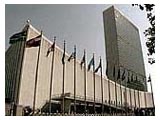|
|
TODAY.AZ / Politics
Azerbaijan's share in UN budget at 0.005%
28 December 2006 [12:32] - TODAY.AZ

General Assembly resolution adopted by consensus late Friday followed lengthy negotiations that produced relatively few changes in the regular budget assessments, which cover day-to-day operations. Dues are determined by a complex formula that is reconsidered every three years in the U.N. budget committee.
The most significant change was Japan's reduction in dues from 19.5 percent in the previous period to 16.6 percent of the budget — a move capping a long campaign by Tokyo.
The United States still remains the largest contributor and Japan the second-largest but Europe's total share now tops Japan's, U.N. officials said.
Germany's share fell slightly from 8.7 percent in the previous period to 8.6 percent but it still remains the third largest contributor. Britain's contribution rose to 6.6 percent from 6.1 percent, putting it in fourth place, followed by France whose contribution increased from 6 percent to 6.3 percent.
The world's two fastest growing economies will pay more in dues — China's increasing from 2 percent to 2.7 percent and India's from 0.42 percent to 0.45 percent. Russia, a permanent Security Council member with a robust economy, will also increase its payments from 1.1 percent to 1.2 percent.
Azerbaijan's share is set at 0.005%, Armenia 0.002%, Ukraine 0.045%, Kazakhstan 0.029, Turkmenistan 0.006, Uzbekistan 0.003%, Georgia 0.003. Among the CIS countries Moldova, Kyrgyzstan and Tajikistan will pay the least dues-- at 0.001%. APA
URL: http://www.today.az/news/politics/34433.html
 Print version
Print version
Connect with us. Get latest news and updates.
See Also
- 03 December 2024 [15:24]
Azerbaijan discusses strengthening cooperation at 28th ECO Foreign Ministers' meeting - 03 December 2024 [14:22]
Azerbaijan elected as chair of UNCCD regional group and COP16 Bureau member - 03 December 2024 [13:32]
U.S. ambassador to Azerbaijan Mark Libby retires from U.S. diplomatic service - 03 December 2024 [13:00]
Stupidity versus cowardice: a new round of confrontation between Pashinyan and Aghazaryan - 03 December 2024 [11:05]
Turkiye appoints new ambassador to Azerbaijan - 03 December 2024 [10:45]
How the West betrayes and continues to betray Georgia and Ukraine - 03 December 2024 [09:38]
Azerbaijani Foreign Minister embarks on visit to Iran - 02 December 2024 [17:33]
CEC announces details of Azerbaijan's upcoming municipal elections - 02 December 2024 [15:00]
Armenian whining and the Azerbaijani magic wand - 02 December 2024 [14:26]
Western influence fuels tensions in post-election Georgia
Most Popular
 Secretary Blinken and Turkish FM Fidan discuss situation in Ukraine and S Caucasus
Secretary Blinken and Turkish FM Fidan discuss situation in Ukraine and S Caucasus
 "Armenian heritage" exists as long as it's funded – how CHW deceives the world.
"Armenian heritage" exists as long as it's funded – how CHW deceives the world.
 How the West betrayes and continues to betray Georgia and Ukraine
How the West betrayes and continues to betray Georgia and Ukraine
 Azerbaijan Defence Ministry presents weekly review
Azerbaijan Defence Ministry presents weekly review
 Armenian whining and the Azerbaijani magic wand
Armenian whining and the Azerbaijani magic wand
 Senegal demands truth for French colonial-era atrocities in West Africa
Senegal demands truth for French colonial-era atrocities in West Africa
 Milli Majlis hosts public hearing on return to Western Azerbaijan
Milli Majlis hosts public hearing on return to Western Azerbaijan
